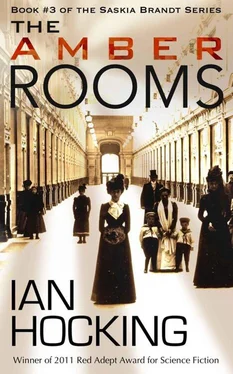Saskia listened to the passers-by and the hoof falls while the superintendent spoke. When he left, she walked around the room. Its curtains were closed and buttoned. Locked concertina doors covered the books. A ginger cat slept on the cooling stove. It reminded her of another cat, Ego. Why were her memories of 2003 returning with such insistence? She might have been an old woman overwhelmed by thoughts of a childhood decades gone.
There was the familiar odour of soot. It was so familiar as to be requisite.
She walked to the icon and looked into its tilted, weeping eyes. She turned and faced the room. There, again in the beautiful corner, she waited.
~
‘They will stage A Life for the Tsar at the Mariinsky next week,’ said the young man, not twenty-five, straightening chairs and adjusting flowers as he crossed the room. A tallow candle burned in his lantern. He passed around the tables with the ease of a waiter. Saskia was surprised that he had not removed his ink-stained apron. The man was either audacious or forgetful. ‘Yes,’ he continued, ‘it is the first production of the season. Do you have a favourite ballerina?’
Saskia looked deliberately at his apron.
‘I have four,’ she said. ‘Karsavina, Pavlova, Siedova and Trefilova.’
The man smiled with relief. ‘You are Judjuna Mikhailovna?’
‘Yes,’ she said, though she had never heard the name. ‘I need to wash and pick up some new clothes. Then I must go to the Tsar’s Village. Can you arrange that?’
‘Everyone calls me Grisha. Costumes? We have costumes to spare. I can arrange everything. Please, come with me.’
He put his arm through Saskia’s and drew her across the room to a battered door, which opened onto a descending staircase.
~
The basement was a pit of three rooms: one for the printing press, a bedroom, and a living room-cum-kitchen. Their walls shone like a cold sweat. Grisha asked Saskia to remain in the living room while he attended the press. She was welcome to eat some beef and unleavened bread. Saskia thanked him and helped herself to the food. As she swallowed, ignoring the gristle, she walked the short perimeter. The bookcase was sloping and damp to the touch. The light bulbs were sooty yet harsh. The air smelled of cabbage, body odour and coffee. Wind piped in the hearth, where flames bowed and curtseyed. Saskia watched them until a lanky, red-haired man appeared at the foot of the stairs. This one was no older than twenty years. He was carrying a newspaper, and his first act was to give it to her.
‘Dry your hair. It must be wet, what with the rain,’ he said, flicking a glance at the ceiling. Then he bowed. ‘You may call me Robespierre.’
Saskia took the newspaper. ‘Thank you. Will you have some of this beef?’
‘No.’ Suddenly, he was embarrassed. ‘It’s for you.’
Saskia smiled. She had found the cell and been accepted. Arrangements would soon be in place for her journey to the Amber Room. She tipped her head to one side and drew a handful of her damp hair through the newspaper. She smiled at Robespierre in a manner that made him touch his fist to his lips and frown.
‘Robespierre?’ she asked. ‘That’s an interesting name.’
The man shrugged and put his hands into the pockets of his suit as he leaned against the mantel. Saskia heard the crinkle of more newspaper and she thought of the hidden doves of magicians. His collar was winged, student style. The bones of his cheeks were high but their flesh was dappled with smallpox scars. He stared at her sideways.
‘I chose it with some care,’ he said.
‘How many of you work here?’
Oddly, he switched from Russian to French, as though he wished to keep his name in focus. ‘Two, since they took Lera. Will you have some vodka?’
‘No, thank you.’
Robespierre pursed his lips as though this was an unexpected behaviour. Saskia thought he was right. She continued to watch him while she dried her hair using the newspaper.
‘What’s wrong with your left hand?’ he asked.
‘Why should there be anything wrong with it?’
‘You haven’t taken it out of your warmer. Did you hurt it?’ He stepped to the opposite side of the hearth. ‘Can I get you some medicine?’
Saskia had an idea that there was no medicine to be had.
‘No, thank you. To answer your question, I hurt it on the train.’
Loudly, Robespierre said, ‘Did you fight with her, the traitor?’
Saskia paused in her drying. Whom did he mean? Which traitor, of the endless parade, did he mean? Or was it a question designed to test her?
‘You are surprised that the traitor is a woman, Robespierre?’
‘That would offend my sense of equality, sister,’ he countered. Something in his expression changed. He added, ‘It is well known that the woman from the Caucasus has supernatural powers.’
Saskia laughed to cover her unease. It was possible, though unlikely, that news of her escape from the train had reached this cell. She hoped that Robespierre was cold-reading her. She dropped the newspaper near the bench and resumed her sandwich.
‘Like what?’ she asked, tearing at the beef.
‘Oh, it’s nothing like … My comrade on the Moika claims that this traitor knows when people lie. She can see in the dark.’ Robespierre looked at his shoes. He shrugged. ‘There is also the matter of her left hand. It is missing.’
Saskia stopped eating. She looked at him. ‘What do you study?’
‘I don’t understand.’
In Russian, Saskia said, ‘You’re a student, or dress like one. Let me guess—you study political economy.’
Robespierre pushed a hand through his thick hair. ‘Why do you look at me as if you were better? I studied agronomy until I discharged myself. The decision was mine.’ He looked at the hearth. ‘I am a comrade.’
‘Then you should choose your words with greater care,’ Saskia said. She looked at the door to the staircase. It was closed but not locked. ‘This is not the time for differences of opinion.’
‘I didn’t mean that,’ said Robespierre. He scratched his eyebrow with a thumb. Pinched off a louse. ‘That is not what I meant.’
‘Robespierre,’ she said, swallowing. Why did she pity him, so suddenly and so fiercely? ‘Imagine your namesake here, right now. Think of an eighteenth century French revolutionary manifest in Russia, in troubled times, in the body of a man who stuffs his suit with newspaper to keep warm, named for half-baked notions of romance? And, my dear Robespierre, when the Party calls, you will go to the people. And the peasantry will laugh at you. A zemstvo might have you peeling potatoes for a week before they turn you in.’
‘Don’t talk to me like that,’ he said. His shoulders were raised like hackles. ‘Didn’t Pisarev call for society and state to be turned over, like soil, for a new moral code to grow? We must assume the role of gardener, so to speak?’
‘And what costumes have you worn, Judjuna Mikhailovna?’ asked Grisha, entering from the press room. He removed his ink-stained gloves and touched Robespierre once, tenderly, on his pockmarked cheek. Saskia’s loneliness amplified her perception of the exchange. These pressurised environments encouraged the closest friendships. Even love. The embattled press crews lived minute to minute. A nosey superintendent or a chance street-meeting with an informer would end it. More likely, one of the crew would turn informer when the hunger and stupidity of the situation really bit. Loose teeth loosened the mouth.
‘Call me plain old Judjuna,’ said Saskia. ‘I don’t walk a stage.’
‘Oh, we all walk a stage,’ he said, smiling. ‘Do we not, Robespierre?’
‘You look at us as if you are better,’ Robespierre repeated. ‘And yet you boast about violence.’
Читать дальше












